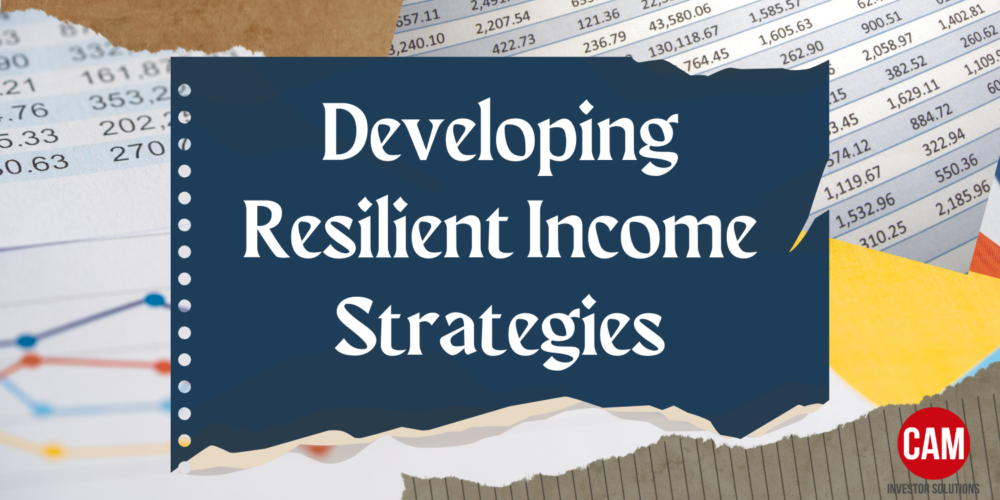Concerned about interest rates lowering and not earning above inflation on your cash and cash-like investments? Read about our new offering!

Are There Better Investments Than My High-Yield Money Market?
In the ever-evolving landscape of personal finance, determining the optimal moment to transition from a high yield money market account to more substantial investments is a crucial decision. And due to the recent flip from making nearly NO interest in money market accounts in 2021 to making 5% or more in some, it’s hard to remember the days when keeping your cash in “cash” was not worth it. How long can the good times last? When will interest rates in money markets go down again and it’s not worth it to keep cash in “cash”? Such a shift can significantly impact your financial growth and stability.
For those that are no longer working or need income from their investment accounts, volatility in interest rates can be stressful. Changes up or down could affect the steady income stream you rely on. Are there better investment account types or strategies to build a resilient steady income “paycheck”? We believe their are!
Understanding Money Market Accounts
High yield money market accounts are known for their safety and liquidity, offering higher interest rates compared to traditional savings accounts. While they provide a secure place to park your funds with easy access, their growth potential is limited, especially when compared to other investment avenues. As life teaches us all, nothing is constant. That’s why at CAM we continuously review current conditions and prepare for “when” rates will change. When central banks change interest rates to control the economy, money market rates usually move in the same direction. So, if interest rates go down, you’ll earn less in your money market accounts. According to the latest Fed statements, rates cuts are not likely to happen this summer but still may be a possibility before year end. When rates do eventually come down, what do you do?
Before diving into investing, assess these key factors that shape your strategy:
- Financial Goals and Timing: Match your investments with your future plans. Aim for higher-growth options for goals far off, like retirement or buying a house.
- How Much Risk You Can Handle: Investing is riskier than keeping money in a savings account. Know how much risk you’re okay with to aim for bigger returns.
- Have Savings Ready for Emergencies: Before investing, make sure you have an emergency fund easily accessible (like a savings account or high yield money market), ideally 3-6 months of expenses, so it’s there when you need it.
After reviewing these factors and deciding it is time to move some money out of your high yield money market account, what do you do with it?
Traditional Investing
To earn more than a money market offers, you will want to invest your cash. There are always the traditional investing strategies:
- Individual Stocks & Bonds: Stocks (i.e. equities) offer growth potential but come with volatility. Bonds provide regular income and are generally less risky than stocks, serving as a middle ground between money markets and equities. Depending on the specific stock or bond, liquidity may be concern.
- Mutual funds & ETFs: For those seeking diversification without the need to pick individual stocks or bonds, mutual funds and ETFs are excellent options. They offer exposure to a broad array of assets and are managed by professionals. Many offer income if that’s needed. Liquidity may or may not be a concern depending on the specific fund.
- Real Estate: Investing in real estate, whether directly or through REITs (Real Estate Investment Trusts), can offer both income and capital appreciation. Direct investment in real estate is usually not liquid. Non-liquid assets are not a good option for cash needed immediately or in the near term.
Non-Traditional Investing
We often get asked if there are other options than the above; especially ones that offer lower risk and just as good or better returns and income. While historically bonds have offered opportunities for investors to generate income with lower risk, our current rate climate makes it more challenging to carve out enough return for the level of risk taken. Non-traditional investing assets can offer investors unique opportunities beyond traditional market strategies.
- Private Debt: Sometimes called private credit, involves loans made by private companies rather than commercial banks. Here, “private” refers to institutional and individual investors, who effectively act as a lender. The borrower is typically a company in need of cash to achieve specific goals. As banks continue to tighten financing, cash-strapped borrowers have increasingly flocked to private debt funding. Borrowers include small and medium-sized enterprises that don’t have ready access to bank financing and/or businesses that need funds quickly.
- Direct Lending: A growing alternative asset class within fixed income investing is direct corporate lending. These funds involve asset managers (sometimes public, sometimes private) providing loans directly to companies. The borrowers are generally small-to-mid-sized companies who may not want to use traditional bank financing.
Due to the private or direct nature of these investments, they are generally not as highly correlated with interest rate changes. This may result in more attractive yields, especially in a low-interest-rate environment. As with all investments, these securities require due diligence and risk assessment to ensure they’re a fit for your investment needs and goals. Investors looking to diversify their portfolios and potentially enhance returns may want to consider non-traditional assets.
The decision to move from a high yield money market to investing should be well-thought-out. The decision should align with your overall financial strategy. By carefully considering your financial goals, market conditions, and personal risk tolerance, you can make informed decisions that enhance your financial growth and security. Remember, the journey to financial well-being is ongoing, and staying informed and adaptable is key to navigating it successfully.
Disclosure
M & A Consulting Group, LLC, doing business as CAM Investor Solutions is an SEC registered investment adviser. As a fee-only firm, we do not receive commissions nor sell any insurance products. We provide financial planning and investment information that we believe to be useful and accurate. However, there cannot be any guarantees.
This blog has been provided solely for informational purposes and does not represent investment advice. Nor does it provide an opinion regarding fairness of any transaction. It does not constitute an offer, solicitation or a recommendation to buy or sell any particular security or instrument or to adopt any investment strategy.
Past performance is not a guarantee of future results. Diversification does not eliminate the risk of market loss. Tax planning and investment illustrations are provided for educational purposes and should not be considered tax advice or recommendations. Investors should seek additional advice from their financial advisor or tax professional.



